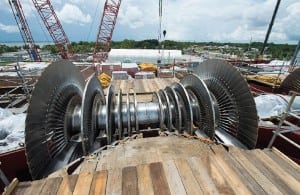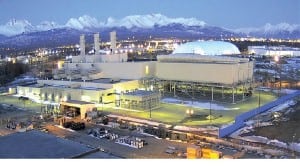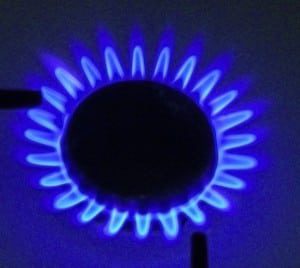Gas
-
Gas
Fuel Cell Unit Could Replace Tactical Diesel Generators for U.S. Military
One lesson learned from the U.S. military’s far-flung operations during the 2010s was the critical importance of fuel supply lines. At the peak of the conflict in Afghanistan, getting each gallon of gasoline or diesel into remote operating bases could cost upwards of $1,000 when all transportation and security costs were factored in. With U.S. […]
-
Gas
Top Plant: Amman East Power Plant, Al Manakher, Jordan
Owner/operator: AES Jordan PSC AES Corp.’s $300 million, 370-MW gas-fired Amman East Power Plant entered commercial service in 2008 and was the first independent power plant in Jordan. The Jordanian
-
Gas
Top Plant: Combined Cycle Power Plant Brazi, Brazi, Romania
Owner/operator: OMV Petrom S.A. Romania began the process of restructuring its vertically integrated, state-owned electricity industry to meet European Union (EU) directives several years before it joined the
-
Gas
Top Plant: Cape Canaveral Next Generation Clean Energy Center, Brevard County, Florida
Owner/operator: Florida Power & Light No one can accuse Florida Power & Light (FPL) of having anything against natural gas. The biggest consumer of gas in a state with the second-biggest appetite for
Tagged in: -
Gas
Top Plant: Sasol Gas Engine Power Plant, Sasolburg, South Africa
Once flush with cheap electricity, the Republic of South Africa has recently been beset by power shortages and reliability challenges as a result of decades of underinvestment in its electrical infrastructure
Tagged in: -
Gas
Top Plant: Southcentral Power Project, Anchorage, Alaska
Owners: Chugach Electric Association Inc. and Anchorage Municipal Light & PowerOperator: Chugach Electric Association Inc. Alaska’s vast land mass broken up by mountainous regions and glacier fields does
-
Gas
Hints of What’s Next from GE on the Technology Front
When Gary Leonard, General Electric’s global technology director for aero-thermal and mechanical systems technologies, spoke with POWER Contributing Editor Mark Axford at this year’s Gulf Coast Power
-
Renewables
Reports: Future Coal and Nuclear Prone to Market Forces, Gas Expansion
Two federally sponsored reports submitted to the Eastern Interconnection States’ Planning Council (EISPC) suggest that the rapid expansion of natural gas could force the closure of between 35 GW and 60 GW of U.S. coal power capacity over the next five years and weaken market forces that now bolster existing nuclear plants. An Energy Department–funded […]
Tagged in: -
Gas
Europe’s Gas Power Plant Carnage Intensifies
Europe’s Gas Power Plant Carnage Intensifies Another 1.2 GW of gas-fired generation has been idled in Germany as utilities scramble to rein losses that are pegged to falling wholesale electricity prices and a surge in renewable power generation. Norwegian power company Statkraft put into “wet reserve” the 800-MW Knapsack 1 and 417-MW Herdecke power plants, […]
Tagged in:









